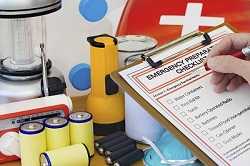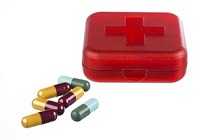Epilepsy & Disaster Preparedness
 Do you know what to do if an emergency strikes? You can’t stop a natural disaster, but you can take steps now to protect yourself and your family, especially those with medical needs such as epilepsy.
Do you know what to do if an emergency strikes? You can’t stop a natural disaster, but you can take steps now to protect yourself and your family, especially those with medical needs such as epilepsy.
Protect yourself and loved ones from natural disasters and public health emergencies.
Preparedness for Everyone
Three basic steps can keep you safe during a natural disaster or other emergency:

- Make an emergency supply kit.
- Create a plan with family and friends.
- Keep up with local alerts.
Preparing People with Epilepsy
Beyond the basic steps above, people with epilepsy have special needs to consider. Keep yourself safe and teach others how to help you.
Think about what you can do now to be ready:

Did you Know?
If you miss just 1 dose of medication,
you can lose control of your
seizures.
Keep your medications with you.
- Taking your medications on time can help prevent seizures. When you leave your house, carry a 3-day supply of your medications in a safe and waterproof location. This way, if you are stranded from your home you will not have to miss a dose.
Have a medical alert bracelet or other identification with you.
- In case you have a seizure while in an emergency shelter, first responders will know how to better assist you during your seizure.
Identify a family member, neighbor or friend to help you during an emergency.
- Talk with people now (such as your family, neighbors, co-workers, school personnel, and friends) about what to do if you have a seizure.
- Teach people how to help you in case you have a seizure.
- Keep a list of important phone numbers handy, including your health care provider and pharmacy.
If possible, know what triggers your seizures.
- For some people with epilepsy, seizures can be triggered by flashing lights, sounds, lack of sleep, stress, or other triggers. Talk with your health care provider about what triggers your seizures and how you might avoid them during a crisis. You can learn more about triggers and managing your epilepsy through WebEase, a free online program.
Learn about seizure first aid from CDC.
Learn about emergency preparedness for people with disabilities.
 "Living in a hurricane zone requires us to take a look at our ‘Go Bag.’ When we receive a hurricane warning, I place a 10-day supply of meds in a waterproof container for both Tom (my husband) and Mikey (our son). We keep other things in our ‘Go Bag’ such as copies of our health insurance cards."
"Living in a hurricane zone requires us to take a look at our ‘Go Bag.’ When we receive a hurricane warning, I place a 10-day supply of meds in a waterproof container for both Tom (my husband) and Mikey (our son). We keep other things in our ‘Go Bag’ such as copies of our health insurance cards."
– Michel, Mother of a child with epilepsy and wife of a man with epilepsy
Get ready now!
More Information
Epilepsy Foundation 24/7 Helpline
Find support information and connect with local resources before and during an emergency by calling 1-800-332-1000 or through online chat.
Get disaster assistance from your local chapter through their website. Learn about what you can do in specific types of disasters, including weather, terrorist attacks, and disease outbreaks.
Get disaster assistance by calling their information line at 211 or connect to your local chapter through their website.
- Page last reviewed: May 18, 2017
- Page last updated: May 18, 2017
- Content source:


 ShareCompartir
ShareCompartir